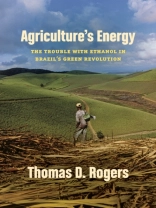Thomas D. Rogers’s history of a modernizing Brazil tracks what happened when a key government program, created in the 1970s by the nation’s military regime, aspired to harness energy produced by sugarcane agriculture to power the country’s economy. The National Alcohol Program, known as Proalcool, was a deliberate economic strategy designed to incentivize ethanol production and reduce gasoline consumption. As Brazil’s capacity grew and as international oil shocks continued, the regime’s planners doubled down on Proalcool. Drawing financing from international lenders and curiosity from other oil-dependent countries, for a time it was the world’s largest oil-substitution and renewable-energy program.Chronicling how Proalcool experimented with and exemplified the consolidation of government, agribusiness, large planters, agricultural and chemical research companies, and oil producers, this book expands into a rich investigation of the arc of Brazil’s Green Revolution. The ethanol boom epitomized the vector of that arc, but Rogers keeps wider development imperatives in view. He dramatizes the choices and trade-offs that ultimately resulted in a losing energy strategy, for Proalcool ended up creating a large contingent of impoverished workers, serious environmental degradation, and persistent hunger. The full consequences of the Green Revolutionfueled consolidation continue to take a toll today.
Thomas D. Rogers
Agriculture’s Energy [EPUB ebook]
The Trouble with Ethanol in Brazil’s Green Revolution
Agriculture’s Energy [EPUB ebook]
The Trouble with Ethanol in Brazil’s Green Revolution
Compre este e-book e ganhe mais 1 GRÁTIS!
Língua Inglês ● Formato EPUB ● Páginas 306 ● ISBN 9781469670478 ● Editora The University of North Carolina Press ● Publicado 2022 ● Carregável 3 vezes ● Moeda EUR ● ID 8748783 ● Proteção contra cópia Adobe DRM
Requer um leitor de ebook capaz de DRM












